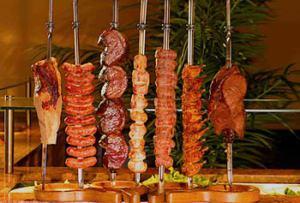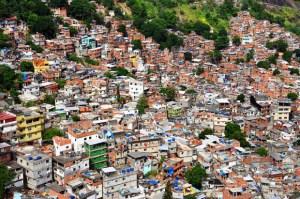I’ve never been to Brazil, though it holds massive appeal to me. There’s a lot to like: rainforest, soccer (they call it futebol), the culture, various meats served on swords. Even the notorious ‘rough’ parts of Brazil seem kind of alluring. Let me explain.

MMMMMMM sword meat…
I’m always interested to see how ‘the other side’ operates and navigates day-to-day life in any country. Not in an idiot poverty-gawking American sense (Look, Ma! That feller’s peein in the street!). My interest in the world’s ‘wrong sides of the tracks’ isn’t academic, journalistic, do-gooder based, thrill-seeking or scientific. I think it’s mostly just inquisitiveness. It’s also practical.
For one thing, I find that meeting people who look and live different than you do is the spice of life. Also, fancy places are pretty similar the world over. Shopping malls in Chengdu, Cape Town, Calcutta and Columbus are largely indistinguishable. Wealth seems to breed insipidness, as well as the propensity toward being a pompous jerk.
Poor places in general are usually just more interesting. Don’t get me wrong, I am well aware that there is nothing fun, quaint, exciting or entertaining about poverty. There’s nothing nice about high infant mortality rates and not having access to life’s basic essentials. What I’m trying to say is that whatever country you’re in, it’s usually the poorer areas where you’ll find the most interesting people, the warmest hospitality, the most innovation, the most unique experiences, and the best food.
Getting a sense of how the poor, the forgotten, the feared and reviled, the outcasts and outliers live is always an enlightening experience. How do they survive? What’s their life like? This seems like a good starting point for trying to figure out a country, and understanding the people who make up a country.
POOR IN SOME WAYS, RICH IN OTHERS
In Brazil, the urban poor live in favelas; sprawling, heaving shantytowns that exist on the fringes of society. Many of these neighborhoods operate like semi-autonomous slum enclaves.

If you haven’t seen City of God – a jarring, gritty film about life in one of Rio’s most notorious favelas (Cidade de Deus) – this seems like a good favela primer (though maybe don’t watch with grandma).
In City of God, we follow the life of a young man who longs to escape his favela’s chaotic world of violence, fear, drugs and crime. It’s a heart-pounding, heartbreaking portrait of a community that is broken and messed up in so many ways, yet not totally devoid of goodness or redemptive stuff.
It’s not a major theme in City of God, but one of the things I gleaned from the film was how connected people in a community like this must be. Nothing drives people together like desperation. This is something that’s struck me in the poorest places I’ve visited around the world.
Poor communities, materially deficient as they may be, tend to be vastly more inter-connected, intertwined and involved in each other’s lives than in rich communities. Poverty and hardships certainly tear things apart, but they can also have the opposite effect of bonding people together in profound ways.
On the other hand, our relative wealth here in the U.S. causes us to lead insular lives. Our full stomachs and vast possessions make being neighborly obsolete. So we go our own way.
We don’t need anyone’s help… until crisis hits.
We tend to look upon folks living in the slums, favelas and mud huts of the world with some combination of pity, fear and disdain. But you know what? I think that in a lot of ways, they’re a lot richer than we are. We’re weighed down by our things. Our stuff tends to prevent us from being good neighbors. We miss out on the richness of living together, trusting other people and leaning on one another. And of course there’s the long term to consider.
I hope all our brothers and sisters living in favelas and in shabby places around the world are comforted by the story of ol’ Lazarus, and the thought of winning in the end…
Filed under: F Commentary, Faith, Film, F Entertainment, Foreign Lands Tagged: Bible, Brazil, Christianity, City of God, favelas, film, Food, movies, poverty, social justice, South America, travel
